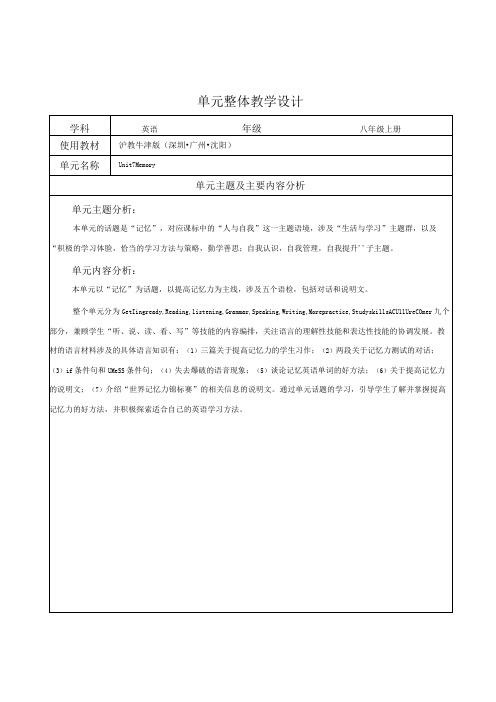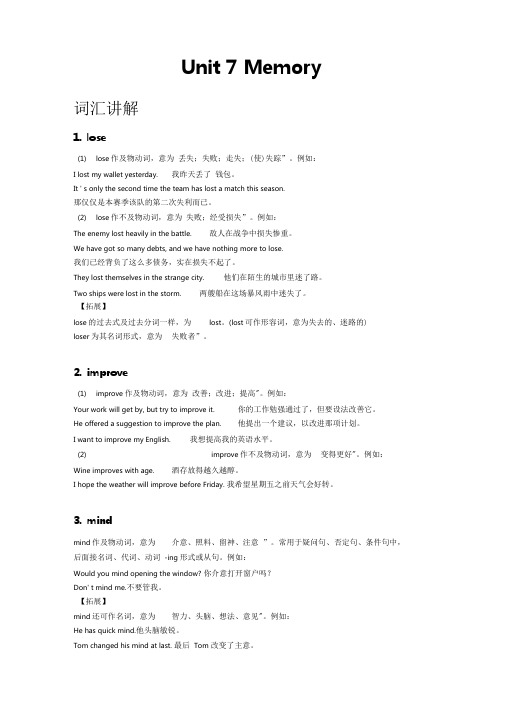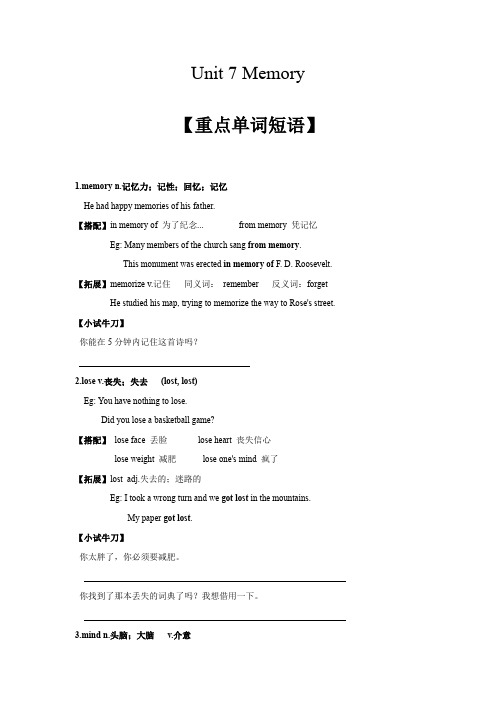Unit 7 Memory (Period 2)
Unit 7 Memory能力测试卷(含听力音频听力书面材料参考答案)

Unit 7 Memory能力测试卷听力部分(25分)I.听录音, 选出你听到的句子,每小题念两遍。
( 5分)()I.A. He has had a full-time job in a small supermarket.B. He has had a part-time job in a small store.C. He has had a part-time job in a small supermarket.()2. A. We shouldn’t try to un derstand things at all.B. We should try to understand things in fact.C. We should try to understand things in nature.()3. A. The scientists have made many important inventions.B. The scientists have produced many interesting products.C. The scientists have made many important discoveries.()4. A. You are no longer a little boy.B. You are still a little boy now.C. You are not a little girl any more.()5. A. Fortunately, no one was badly hurt in the accident.B. Luckily, no one was hurt in the accident.C. Unfortunately, no one was survived in the accident.II.听三段对话,每段播放两遍。
八上 Unit 7 Memory 单元整体教学设计(牛津深圳版八年级上)

单元整体教学设计
(三)存在问题
语言大观念 核心素养的综合表现:运用所学与记忆有关的语言表达,结合自己的经验,介绍提高记忆力的方法。
小观念1:围绕语义整合性学习词汇和表达方式 小观念2:围绕本单元“记忆”的话题,写一段特别的记忆
语篇结构 描述方式
学情分析
(一)自然情况
本单元围绕“记忆”这一话题,开展教学活动,学习提高记忆力的方法,了解数字和单词不同的记忆技巧, 记述记忆中一件难忘的事。
符合ModUIe4Schoo11ife 这个话题的内容探究,以及八年级学生对知识的汲
取需
求。
(二)已有基础
本单元涉及“记忆”这些话题,这涉及到学习方法,学生们或多或少能用英语表达出一些学习方法。
学生 对于if 条件句也相对熟悉。
牛津版沪教版英语八年级(上)Unit-7-Memory-词句讲解+练习+答案

Unit 7 Memory词汇讲解1.lose(1)lose作及物动词,意为丢失;失败;走失;(使)失踪”。
例如:I lost my wallet yesterday. 我昨天丢了钱包。
It ' s only the second time the team has lost a match this season.那仅仅是本赛季该队的第二次失利而已。
(2)lose作不及物动词,意为失败;经受损失”。
例如:The enemy lost heavily in the battle. 敌人在战争中损失惨重。
We have got so many debts, and we have nothing more to lose.我们已经背负了这么多债务,实在损失不起了。
They lost themselves in the strange city. 他们在陌生的城市里迷了路。
Two ships were lost in the storm. 两艘船在这场暴风雨中迷失了。
【拓展】lose的过去式及过去分词一样,为lost。
(lost可作形容词,意为失去的、迷路的)loser为其名词形式,意为失败者”。
2.improve(1)improve作及物动词,意为改善;改进;提高"。
例如:Your work will get by, but try to improve it. 你的工作勉强通过了,但要设法改善它。
He offered a suggestion to improve the plan. 他提出一个建议,以改进那项计划。
I want to improve my English. 我想提高我的英语水平。
(2) improve作不及物动词,意为变得更好"。
例如:Wine improves with age. 酒存放得越久越醇。
I hope the weather will improve before Friday. 我希望星期五之前天气会好转。
牛津深圳版英语八年级上册 Unit 7-第4课时 听说(1)

请你准备第二个问题。 你想问他现在从事什么职业,你问:
What do you do now?/What is your job now?
谢谢您的观看与聆听
( BB )
What can grains make us? A.Grow fat. B.Grow fast. C.Grow thin.
( CC ) What is good for our teeth and skin?
A.Milk.
B.Fruit.
C.Fruit and vegetables.
sound similar. 科学家认为 B 组更难记住因为 B 组的词听上去相似。
★ 听说测试
答案见:P7
一、模仿朗读。(共 3 分)
听以下短文一遍,给你 50 秒钟的时间准备,然后模仿朗读,
当听到“开始录音”的信号后,立即在 50 秒钟内朗读短文,当听
到要求“停止录音”的信号时,应立即终止朗读。请听录音。
stsatratretdedprpacrtaicctiincginhgis hmisemmoreymeovreyryedvaeyryanddatyhatanchdantgheadt hchisanlgifeed. hIins li2fe0.0I7n, 2I00t7o,oIktopoakrtpairnt inthteheWWoorrldld MMeemmoorryy CChhaammppiioonnsshhiipp aanndd wwoonn tthhee ffiirrsstt pprriizzee.. HHee ffeeeell tthhaatt aa ggoooodd mmeemmoorryy iiss iimmppoorrttaanntt ffoorr oouurr lliivveess..
Unit7MemoryInventions重点单词词性转换(练习)牛津深圳版八年级英语上册

n
自行车
ride a bicycle骑自行车
similar
adj
相似的
in a similar way按同样的方式
similarly
adv
相似地
He was late and I similarly was delayed.
similarity
n
类似;相似
There were points of similarity between them.
n
头脑;大脑
make up your mind下定决心
adj
留心的;警觉的
He is mindful of his duties.
adj
不小心的;愚蠢的
It’s tiring and mindless work.
adj
值得;有价值
He is worth a million.
adj
有价值的;可尊敬的
He is worthy of our praise.
改进;改善
Don’t lose a chance to improve your position.
n
改进
There is room for improvement.
n
拼写;拼法
Does the message use correct spelling?
v
拼写
How to spell this word.
adj
显著的;值得纪念的
It was a truly memorable experience.
v
遗失;使迷路
lose oneself迷路
adj
失去的;迷惑的
Unit 7 Memory课文填空及综合阅读牛津深圳版英语八年级上册

U7课文填空练习MemoryMemory CornerHenry, Paula and Millie write 1. __________________ the school newspaper. They have 2. _________________ (write)the short articles below to help students improve their memory.HenryA great way to help you remember something is 3. ___________________ (imagine)a picture of it 4. _________________ your mind. 5 __________________ .you make the picture big, strange or sily, you 6 ______________________________ (remember)it 7. _________________ (well). For example, 8. __________________ (remember)the word n smiles n, we can imagine there is n mile n between the9. (one)letter and the last letter. This makes it the10 ________________ . (long)word in the world. Remember: a picture is worth a thousand words.PaulaA good method 11. ____________________ 12. _________________ (remember)the13 ________________ .(spell) of a word is to make a short sentence14.________________ each letter of the word. For example,15.________________ you want to remember how 16. ________________ (spell) the word "because11, you can use the sentence H Big elephants can always understand small elephants".MillieYou 17. _______________ forget something very 18. ___________________________ (quick) 19. ___________ you understand it 20. ______________ (good). For example, you may have trouble 21. _____________ (remember) the list of 22. _______________ (step) in the water cycle. However, it is 23. ______________ (easy)to remember these steps if you understand 24. ____________ the water cycle 25. ____________ (work).How to improve your memoryMemory is very important. It helps you remember who you are and what you plan2. _______ (do)in the future. So, how can you improve your memory?It is important 3. __________ (exercise)your brain. For example, you can do new things and change your 4. _________ day habits. If you walk a different way to school or take a different bus, you will keep your brain 5. __________ ( act). You can try to 6. (memory)something new. You can try a Maths puzzle. You can also earn new 7. (skill) or study a foreign language. Your brain gets lots of regularexercise if you of 8. _________ (this) things. If you live a 9. ___________ (health)life, your memory will work 10. ___________ (good). You must have a 11. _____________ (balance)diet. You must give your brain enough time 12. (rest). 13. you get enough every night, you will notremember things 14. _________ (good).If you want your brain to work well, you also need 15. _________ (relax). If you get too 16. _____________ your brain will slow 17. ________ , and your memory will become 18. ________ (little)sharp.So,19. ________ improve your memory, you should exercise your brain, live ahealthy life and stay 20. ________ (relax).综合阅读Memory CornerHenry, Paula and Millie write for the school newspaper. They have written the short articles below to help students improve their memory.HenryA great way(A) _____ h elp you remember something is to imagine a picture of it in your mind. If you make the picture big, strange or silly, you will remember it better. For example, to remember the word n smiles n, we can imagine there is a mile(B) __________ the first letter and the last letter.(C)这使得它成为世界上最长的单词.①PaulaA good (D)method for remembering the spelling of a word is to make a short sentence with(E)each letter of the word. For example, if you want to remember how to spell theword "because”, you can use the sentence n Big elephants can always understand small elephants".2・Millie(F)You will forget something very quickly unless you understand it well. For example, you may have trouble remembering the list of steps in the water cycle. However, it is easier to remember these steps if you understand how the water cycle works. 31. ______________________________________ 在文中(A)和(B)的空白处填入适当的单词: _________________________________ , ____________2.将文中画线部分(C)译成英语: _________________3. _________________________________________ 写出文中画线部分(D)和(E)的同义词或近义词: _____________________________ , ____________4.在文中①②③选出能够填入“Remember: picture is worth thousand words"的位置:5.将文中画线部分(F)改写为:You will forget something very quickly ______ you ___________ understand it well.。
牛津深圳版英语八年级上Unit7 Memory 单词+语法(条件状语从句+if not,unless)(无答案)

Unit 7 Memory【重点单词短语】1.memory n.记忆力;记性;回忆;记忆He had happy memories of his father.【搭配】in memory of 为了纪念... from memory 凭记忆Eg: Many members of the church sang from memory.This monument was erected in memory of F. D. Roosevelt. 【拓展】memorize v.记住同义词:remember 反义词:forget He studied his map, trying to memorize the way to Rose's street. 【小试牛刀】你能在5分钟内记住这首诗吗?2.lose v.丧失;失去(lost, lost)Eg: You have nothing to lose.Did you lose a basketball game?【搭配】lose face 丢脸lose heart 丧失信心lose weight 减肥lose one's mind 疯了【拓展】lost adj.失去的;迷路的Eg: I took a wrong turn and we got lost in the mountains.My paper got lost.【小试牛刀】你太胖了,你必须要减肥。
你找到了那本丢失的词典了吗?我想借用一下。
3.mind n.头脑;大脑v.介意Eg: There was no doubt in his mind that the man was serious.You have a good mind. 你有聪明的头脑。
【搭配】make up one’s mind to do sth. 下定决心做某事have sth./sb. in one’s mind 某人想着某事或某人mind one’s doing sth. 介意某人做某事【小试牛刀】你介意我坐在你旁边吗?我决定从今天起努力学习,使我的父母因我而骄傲。
英语八上《Unit 7 Memory Reading“Memory Corner“》_9

8A U7 Reading Memory CornerLesson Plan(缩减版)学科:初中英语版本: 牛津上海版本课内容来自牛津英语上海版八年级上册第7 单元的阅读板块。
此单元以“记忆”为话题,以提高记忆力的方法为主线。
阅读(Reading)板块中主阅读篇章的体裁为说明文,本课作为阅读课的第一课时,以引导学生了解主阅读篇章的主旨大意及深入理解文本细节为主要目标。
语言知识目标:能掌握并运用:memory, trouble, list, method, improve, mention.语言技能目标:1.能在阅读过程中熟练运用阅读微技能(预测predicting; 略读skimming;扫读scanning和细节阅读reading for details)。
2.能与小组成员讨论并总结出课文主人公Henry, Paula, Millie 关于提高记忆力的方法。
情感目标:积极与人合作,探索适合自己的记忆方法。
●教学重点:能通过阅读了解和掌握三种有效的记忆方法。
●教学难点:1) A great way to help you remember something is to imagine a picture of it inyour mind.2) If you make the picture big, strange, or silly, you will remember it better.●Students analysis:本课的教学对象为初二学生, 在学习本课之后,他们更能阅读与理解关于科学的文章,为本单元后面的More Practice的教学做好铺垫。
●Teaching methods: Task-based teaching methodology, discussing method ofteaching;●Learning strategy:Communicative learning strategy.●Use of media:VCR, PPT, Flash, Blackboard,student sheetsTeaching procedures。
- 1、下载文档前请自行甄别文档内容的完整性,平台不提供额外的编辑、内容补充、找答案等附加服务。
- 2、"仅部分预览"的文档,不可在线预览部分如存在完整性等问题,可反馈申请退款(可完整预览的文档不适用该条件!)。
- 3、如文档侵犯您的权益,请联系客服反馈,我们会尽快为您处理(人工客服工作时间:9:00-18:30)。
If, you will find out its meaning.
● I hate getting up! I always feel tired in the morning.
If, you won’t feel tired.
Unit 7 Memory
(Period 2)
教学内容
Reading (pp. 98-99), Vocabulary C2 (p. 100), Comprehension D2 (p. 101), Grammar (pp. 103-105)
教学目标
语言知识
1.深入理解文本内容,了解人类记忆的特点和提高记忆力的一些方法。
Millie
You will forget something very quickly unless youunderstand it well.
4.学生回答以下问题。
What do the three articles consist of? (c)
a. Only ideas.
b. Only examples.
c. Both ideas and examples.
5.学生回答以下问题,深入理解主阅读篇章的内容。
● What kind of picture should we make when we want to remember a
word? (We should make a big, strange or silly picture.)
2.学生完成练习B1,并口头汇报答案。
3.学生完成练习B2,并口头汇报答案。
回家作业
1.用unless引导的条件状语从句完成下面的句子,并用if…not结构改写。
● You will not remember these steps.
● Students will not learn English well.
● Can we remember something easily if we don’t understand it? (No,
we can’t.)
6.学生四人一组,选择主阅读篇章中介绍的一种记忆方法,结合自身
的经历举例说明。
Step 2复习if条件句表示某种条件下可能出现的结果,学习if条件句表示条件与结果之间存在必然联系。
教学重点
if…not结构与unless引导的条件状语从句之间的转换。
教学难点
掌握用if条件句表示条件与结果之间存在必然联系。
教学过程
教学过程
教学过程
Step 1回顾主阅读篇章,检查回家作业的落实情况。
1.学生完成Vocabulary C2的练习,并口头汇报答案。
2.学Байду номын сангаас完成Comprehension D2的练习,并口头汇报答案。
● What is a picture worth? (A picture is worth a thousand words.)
● What kind of sentence should we make when we want to remember
the spelling of a word? (A short sentence.)
Ifyou telephone your friends, they will tell you what homework you
should do.
● I sometimes forget what things to buy at the supermarket.
If, you will remember what things to buy.
3.学生填写下表,回顾主阅读篇章的主旨大意。
Memory Corner
Henry
A great way to help you remember something is toimagine a pictureof it in your mind.
Paula
A good method for remembering the spelling of a word is tomake a short sentence with each letterof the word.
6.学生完成练习A3,并口头汇报答案。
Step 3学会使用由unless引导的条件状语从句,以及unless引导的条件状语从句与if…not结构之间的转换。
1.学生朗读教材第104页的例句,并自主总结unless引导的条件状语从句与if…not结构之间的转换规则。教师向学生讲解Things to remember的内容。
1.学生朗读主阅读篇章中的if条件句。教师口头总结if条件句的用法,即:主句使用一般将来时,if从句使用一般现在时。
2.学生根据所给情景,两人一组讨论完成下列句子。
● I was away from school today. I don’t know what homework I
should do.
3.学生阅读教材第103页的例句,并完成Work out the rule部分的内容。教师口头总结if条件句的另一种用法,即:主句和从句都用一般现在时,表示条件一旦成立,结果必然发生。同时向学生讲解Things to remember的内容。
4.学生完成练习A1,并口头汇报答案。
5.学生朗读练习A2的示例对话,然后两人一组,编制对话。
● The environment will get worse.
● We will not be successful.
2.完成《练习册》第99至101页Grammar和第106至107页Reading B, C的练习。
2.掌握用if条件句表示条件与结果之间存在必然联系的用法。
3.掌握unless引导的条件状语从句的用法,以及unless引导的条件状语从句与if…not结构之间的转换。
语言技能
1.运用找读策略,深入理解文章的内容。
2.用if条件句完成对话。
情感态度
了解人脑及记忆力的相关知识,养成健康的生活方式,保持活跃的思维与记忆力。
